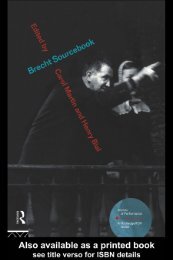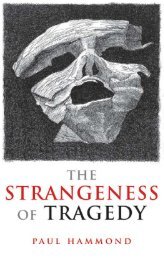- Page 2 and 3: Bloom’s Modern Critical ViewsAfri
- Page 4 and 5: Bloom’s Modern Critical ViewsWILL
- Page 6 and 7: ContentsEditor’s NoteviiIntroduct
- Page 8 and 9: Editor’s NoteThis volume seeks to
- Page 10: Editor’s NoteixLanham proposes an
- Page 13 and 14: 2Harold Bloomof omission as it is o
- Page 15 and 16: 4Harold Bloomknowledge, and nausea
- Page 17 and 18: 6Harold Blooma potential playwright
- Page 20 and 21: FRANK O’CONNORMasterpiecesWith Ro
- Page 22 and 23: Masterpieces 11Like all actors, Sha
- Page 26 and 27: E. PEARLMANThe Invention of Richard
- Page 28 and 29: The Invention of Richard of Glouces
- Page 30 and 31: The Invention of Richard of Glouces
- Page 32 and 33: The Invention of Richard of Glouces
- Page 34 and 35: The Invention of Richard of Glouces
- Page 36 and 37: The Invention of Richard of Glouces
- Page 38 and 39: The Invention of Richard of Glouces
- Page 40 and 41: The Invention of Richard of Glouces
- Page 42 and 43: The Invention of Richard of Glouces
- Page 44 and 45: The Invention of Richard of Glouces
- Page 46 and 47: The Invention of Richard of Glouces
- Page 48 and 49: The Invention of Richard of Glouces
- Page 50: The Invention of Richard of Glouces
- Page 53 and 54: 42Erich Segalepisodes or errors, th
- Page 55 and 56: 44Erich SegalWater isn’t more lik
- Page 57 and 58: 46Erich SegalYet hers is a voice of
- Page 59 and 60: 48Erich SegalShakespeare employs si
- Page 61 and 62: 50Erich SegalBut in the Comedy of E
- Page 63 and 64: 52Erich SegalAnd every one doth cal
- Page 65 and 66: 54Erich SegalTo Plautus’ simple r
- Page 67 and 68: 56Erich Segal2. Harold Bloom, Shake
- Page 69 and 70: 58Erich Segal52. Ibid., 3.2.143.53.
- Page 71 and 72: 60Harold Bloomat the high cost of a
- Page 73 and 74: 62Harold BloomThat stops my way in
- Page 75 and 76:
64Harold BloomTo watch the night in
- Page 78 and 79:
THOMAS M. GREENELove’s Labour’s
- Page 80 and 81:
Love’s Labour’s Lost: The Grace
- Page 82 and 83:
Love’s Labour’s Lost: The Grace
- Page 84 and 85:
Love’s Labour’s Lost: The Grace
- Page 86 and 87:
Love’s Labour’s Lost: The Grace
- Page 88 and 89:
Love’s Labour’s Lost: The Grace
- Page 90 and 91:
Love’s Labour’s Lost: The Grace
- Page 92 and 93:
Love’s Labour’s Lost: The Grace
- Page 94 and 95:
Love’s Labour’s Lost: The Grace
- Page 96 and 97:
HAROLD C. GODDARDThe Meaning of Sha
- Page 98 and 99:
The Meaning of Shakespeare: Romeo a
- Page 100 and 101:
The Meaning of Shakespeare: Romeo a
- Page 102 and 103:
The Meaning of Shakespeare: Romeo a
- Page 104 and 105:
The Meaning of Shakespeare: Romeo a
- Page 106 and 107:
The Meaning of Shakespeare: Romeo a
- Page 108 and 109:
The Meaning of Shakespeare: Romeo a
- Page 110 and 111:
The Meaning of Shakespeare: Romeo a
- Page 112 and 113:
The Meaning of Shakespeare: Romeo a
- Page 114 and 115:
The Meaning of Shakespeare: Romeo a
- Page 116 and 117:
The Meaning of Shakespeare: Romeo a
- Page 118 and 119:
The Meaning of Shakespeare: Romeo a
- Page 120 and 121:
G.K. CHESTERTONA Midsummer Night’
- Page 122 and 123:
A Midsummer Night’s Dream 111cann
- Page 124 and 125:
A Midsummer Night’s Dream 113pers
- Page 126 and 127:
A Midsummer Night’s Dream 115aest
- Page 128 and 129:
NORTHROP FRYEThe Bolingbroke Plays(
- Page 130 and 131:
The Bolingbroke Plays 119that time
- Page 132 and 133:
The Bolingbroke Plays 121nature and
- Page 134 and 135:
The Bolingbroke Plays 123that his o
- Page 136 and 137:
The Bolingbroke Plays 125successful
- Page 138 and 139:
The Bolingbroke Plays 127By being s
- Page 140 and 141:
The Bolingbroke Plays 129made so ma
- Page 142:
The Bolingbroke Plays 131Ever since
- Page 145 and 146:
134A.C. Bradleyvirtue of two matron
- Page 147 and 148:
136A.C. BradleyGo, carry Sir John F
- Page 149 and 150:
138A.C. Bradleyfrequented Sir John
- Page 151 and 152:
140A.C. Bradleykeeping himself out
- Page 153 and 154:
142A.C. Bradleyhe enjoys, no doubt
- Page 155 and 156:
144A.C. Bradleyinduce him to tell.
- Page 157 and 158:
146A.C. Bradleythem to be as true-b
- Page 159 and 160:
148A.C. Bradleyas a ruffian serious
- Page 161 and 162:
150A.C. BradleyFalstaff ’s coward
- Page 163 and 164:
152Joseph Westlundideal love and th
- Page 165 and 166:
154Joseph WestlundTherefore my merc
- Page 167 and 168:
156Joseph WestlundThe practical and
- Page 169 and 170:
158Joseph Westlundthis contributes
- Page 171 and 172:
160Joseph WestlundThan to live stil
- Page 173 and 174:
162Joseph Westlundpersecution of Je
- Page 175 and 176:
164Joseph Westlundsociety. The note
- Page 177 and 178:
166Joseph Westlundjustifications th
- Page 179 and 180:
168Barbara Everettplay’s criticis
- Page 181 and 182:
170Barbara Everettfamiliar colloqui
- Page 183 and 184:
172Barbara Everettmoment I want onl
- Page 185 and 186:
174Barbara EverettWe think of Launc
- Page 187 and 188:
176Barbara Everettordinary people.
- Page 189 and 190:
178Barbara Everettsimilarly like to
- Page 191 and 192:
180Barbara Everettthat turned on st
- Page 193 and 194:
182William Hazlitthow to exercise t
- Page 195 and 196:
184William HazlittOf what your reve
- Page 197 and 198:
186William HazlittWhat infinite hea
- Page 199 and 200:
188William Hazlittas we see in this
- Page 201 and 202:
190William Hazlittthe people not on
- Page 203 and 204:
192William Hazlittthus given in Sir
- Page 205 and 206:
194William Hazlittprayers. For the
- Page 208 and 209:
DAVID QUINT“Alexander the Pig”:
- Page 210 and 211:
“Alexander the Pig”: Shakespear
- Page 212 and 213:
“Alexander the Pig”: Shakespear
- Page 214 and 215:
“Alexander the Pig”: Shakespear
- Page 216 and 217:
“Alexander the Pig”: Shakespear
- Page 218 and 219:
“Alexander the Pig”: Shakespear
- Page 220 and 221:
“Alexander the Pig”: Shakespear
- Page 222 and 223:
“Alexander the Pig”: Shakespear
- Page 224 and 225:
“Alexander the Pig”: Shakespear
- Page 226 and 227:
“Alexander the Pig”: Shakespear
- Page 228 and 229:
LAWRENCE DANSONJulius CaesarIn the
- Page 230 and 231:
Julius Ceasar 219without the sign /
- Page 232 and 233:
Julius Ceasar 221Brutus; and the wo
- Page 234 and 235:
Julius Ceasar 223name of the deed b
- Page 236 and 237:
Julius Ceasar 225immediately clear.
- Page 238 and 239:
Julius Ceasar 227From a slightly di
- Page 240:
Julius Ceasar 229aspects of his med
- Page 243 and 244:
232James P. Bednarzthat intensified
- Page 245 and 246:
234James P. BednarzTouchstone, and
- Page 247 and 248:
236James P. BednarzDoth it not flow
- Page 249 and 250:
238James P. Bednarzagainst Jonson.
- Page 251 and 252:
240James P. Bednarz[variable and go
- Page 253 and 254:
242James P. Bednarzwas a repertory
- Page 255 and 256:
244James P. BednarzAUDREYWILLIAMthe
- Page 257 and 258:
246James P. BednarzWilliam, after a
- Page 259 and 260:
248James P. BednarzIf we accept the
- Page 261 and 262:
250James P. BednarzAlthough the Son
- Page 263 and 264:
252James P. Bednarzand nature. Sinc
- Page 265 and 266:
254James P. Bednarzplaywrights conf
- Page 267 and 268:
256James P. Bednarzinnocent younger
- Page 269 and 270:
258James P. Bednarzor cormorants th
- Page 271 and 272:
260James P. BednarzArdens,” in Sh
- Page 273 and 274:
262James P. Bednarz61. “Upon Mast
- Page 275 and 276:
264John HollanderThe emblematic cha
- Page 277 and 278:
266John HollanderOh, when mine eyes
- Page 279 and 280:
268John Hollanderwear not motley in
- Page 281 and 282:
270John HollanderBut he continues t
- Page 283 and 284:
272John Hollanderthat it is made on
- Page 285 and 286:
274John HollanderFor Orsino and Vio
- Page 287 and 288:
276John Hollander3. See my own “M
- Page 289 and 290:
278Richard A. Lanhamof-the-leading-
- Page 291 and 292:
280Richard A. LanhamThen goes he to
- Page 293 and 294:
282Richard A. LanhamUpon whose prop
- Page 295 and 296:
284Richard A. LanhamIf his chief go
- Page 297 and 298:
286Richard A. Lanhamsatisfaction wi
- Page 300 and 301:
PATRICIA PARKERDilation and Inflati
- Page 302 and 303:
Dilation and Inflation 291“felici
- Page 304 and 305:
Dilation and Inflation 293no living
- Page 306 and 307:
Dilation and Inflation 295till I ha
- Page 308 and 309:
Dilation and Inflation 297After wel
- Page 310 and 311:
Dilation and Inflation 299in its ea
- Page 312 and 313:
Dilation and Inflation 301Madam, my
- Page 314 and 315:
Dilation and Inflation 303putting o
- Page 316 and 317:
Dilation and Inflation 305sentence
- Page 318 and 319:
Dilation and Inflation 307riddling.
- Page 320 and 321:
Dilation and Inflation 309therein w
- Page 322 and 323:
Dilation and Inflation 311female fi
- Page 324 and 325:
Dilation and Inflation 313riddling
- Page 326 and 327:
Dilation and Inflation 315or “inc
- Page 328 and 329:
Dilation and Inflation 317All’s W
- Page 330 and 331:
Dilation and Inflation 319king. In
- Page 332 and 333:
Dilation and Inflation 321entreat b
- Page 334 and 335:
Dilation and Inflation 323(although
- Page 336 and 337:
Dilation and Inflation 325puts off
- Page 338 and 339:
Dilation and Inflation 327Performan
- Page 340 and 341:
Dilation and Inflation 32919. See T
- Page 342 and 343:
Dilation and Inflation 331service d
- Page 344 and 345:
Dilation and Inflation 333York: Rou
- Page 346 and 347:
Dilation and Inflation 335Anglo-Ame
- Page 348 and 349:
Dilation and Inflation 33755. See,
- Page 350 and 351:
Dilation and Inflation 33967. Timot
- Page 352 and 353:
Dilation and Inflation 341counting
- Page 354 and 355:
RONALD R. MACDONALDMeasure for Meas
- Page 356 and 357:
Measure for Measure: The Flesh Made
- Page 358 and 359:
Measure for Measure: The Flesh Made
- Page 360 and 361:
Measure for Measure: The Flesh Made
- Page 362 and 363:
Measure for Measure: The Flesh Made
- Page 364 and 365:
Measure for Measure: The Flesh Made
- Page 366 and 367:
Measure for Measure: The Flesh Made
- Page 368 and 369:
Measure for Measure: The Flesh Made
- Page 370 and 371:
GRAHAM BRADSHAWDramatic Intentionsi
- Page 372 and 373:
Dramatic Intentions in Othello 361b
- Page 374 and 375:
Dramatic Intentions in Othello 363
- Page 376 and 377:
Dramatic Intentions in Othello 365r
- Page 378 and 379:
Dramatic Intentions in Othello 367I
- Page 380 and 381:
Dramatic Intentions in Othello 369c
- Page 382 and 383:
Dramatic Intentions in Othello 371b
- Page 384 and 385:
Dramatic Intentions in Othello 373M
- Page 386 and 387:
Dramatic Intentions in Othello 375w
- Page 388 and 389:
Dramatic Intentions in Othello 377p
- Page 390 and 391:
Dramatic Intentions in Othello 379T
- Page 392 and 393:
Dramatic Intentions in Othello 381M
- Page 394 and 395:
Dramatic Intentions in Othello 383D
- Page 396 and 397:
Dramatic Intentions in Othello 385r
- Page 398 and 399:
Dramatic Intentions in Othello 387c
- Page 400 and 401:
Dramatic Intentions in Othello 389t
- Page 402 and 403:
Dramatic Intentions in Othello 391u
- Page 404 and 405:
Dramatic Intentions in Othello 393
- Page 406 and 407:
Dramatic Intentions in Othello 395c
- Page 408 and 409:
Dramatic Intentions in Othello 397a
- Page 410 and 411:
Dramatic Intentions in Othello 399G
- Page 412 and 413:
Dramatic Intentions in Othello 401f
- Page 414 and 415:
Dramatic Intentions in Othello 403C
- Page 416 and 417:
Dramatic Intentions in Othello 405t
- Page 418 and 419:
Dramatic Intentions in Othello 407w
- Page 420:
Dramatic Intentions in Othello 409a
- Page 423 and 424:
412William Empsonwhich would put th
- Page 425 and 426:
414William EmpsonMacbeth is that he
- Page 427 and 428:
416William Empsonfound a royal line
- Page 429 and 430:
418William Empsononce. I hope I do
- Page 431 and 432:
420William Empsonintended to be as
- Page 433 and 434:
422William Empson“episodic intens
- Page 435 and 436:
424William EmpsonWilson, that Macbe
- Page 437 and 438:
426William Empsonincessantly from i
- Page 439 and 440:
428William EmpsonK. Chambers for sa
- Page 441 and 442:
430Janet Adelmanchoice will determi
- Page 443 and 444:
432Janet AdelmanAntony’s words as
- Page 445 and 446:
434Janet AdelmanAntony and Cleopatr
- Page 447 and 448:
436Janet Adelmanwhich is supplied b
- Page 449 and 450:
438Janet Adelmanhuman limitation: t
- Page 451 and 452:
440Janet AdelmanWhen Octavius hears
- Page 453 and 454:
442Janet AdelmanP OETIC P ROCESS AS
- Page 455 and 456:
444Janet Adelmanto be a child of th
- Page 457 and 458:
446Janet Adelmana human vice; in Eg
- Page 459 and 460:
448Janet AdelmanBoth Cleopatra and
- Page 461 and 462:
450Janet AdelmanAgrippa knows “Sh
- Page 463 and 464:
452Janet Adelmanpromise, but it no
- Page 465 and 466:
454Janet AdelmanCleo. If it be love
- Page 467 and 468:
456Janet Adelmanexplicable; but wha
- Page 469 and 470:
458Janet Adelmanbounds. Virtually a
- Page 471 and 472:
460Janet AdelmanIn this watery worl
- Page 473 and 474:
462Janet AdelmanIn their deaths, th
- Page 475 and 476:
464Janet Adelman... The very dice o
- Page 477 and 478:
466Janet AdelmanT HE S TRUCTURE OF
- Page 479 and 480:
468Janet Adelmanin love. When this
- Page 481 and 482:
470Janet AdelmanCleopatra, like the
- Page 483 and 484:
472Janet AdelmanLear expresses the
- Page 485 and 486:
474Janet Adelmanaltogether. Proser
- Page 487 and 488:
476Janet Adelmandistinct from that
- Page 489 and 490:
478Janet Adelmanclearly not a portr
- Page 491 and 492:
480Janet AdelmanAbbot, A briefe des
- Page 493 and 494:
482Janet AdelmanThat Venus of the f
- Page 495 and 496:
484Janet AdelmanMacbeth.” This pe
- Page 498 and 499:
STEPHEN ORGELThe Poetics of Incompr
- Page 500 and 501:
The Poetics of Incomprehensibility:
- Page 502 and 503:
The Poetics of Incomprehensibility:
- Page 504 and 505:
The Poetics of Incomprehensibility:
- Page 506:
The Poetics of Incomprehensibility:
- Page 509 and 510:
498A.D. NuttallShakespeare. Sylvest
- Page 511 and 512:
500A.D. Nuttallapprehension through
- Page 513 and 514:
502A.D. NuttallProspero and Miranda
- Page 515 and 516:
504A.D. NuttallSometimes a thousand
- Page 517 and 518:
506A.D. NuttallPlato; for example,
- Page 519 and 520:
508A.D. Nuttalladdressed to Ferdina
- Page 521 and 522:
510A.D. Nuttalltranscendentalist me
- Page 523 and 524:
512A.D. Nuttallis associated with t
- Page 525 and 526:
514A.D. Nuttallgiven to the ambiguo
- Page 527 and 528:
516A.D. Nuttallconceived as a super
- Page 530 and 531:
Chronology1564 William Shakespeare
- Page 532 and 533:
ContributorsHAROLD BLOOM is Sterlin
- Page 534 and 535:
Contributors 523Comparative Literat
- Page 536 and 537:
BibliographyAdelman, Janet. The Com
- Page 538 and 539:
Bibliography 527———. Shakespe
- Page 540:
Bibliography 529Uphaus, Robert W. B
- Page 543 and 544:
532Acknowledgments“A Midsummer Ni
- Page 546 and 547:
IndexAdelman, Janeton the bed trick
- Page 548 and 549:
Index 537on “mocking reveller,”
- Page 550 and 551:
Index 539Colie, Rosalie, 252Comedy
- Page 552 and 553:
Index 541abandoning Juliet, 106arri
- Page 554 and 555:
Index 543Jaggard, William, 250Jaque
- Page 556 and 557:
Index 545the need for prudence, 162
- Page 558 and 559:
Index 547Popeon linguistics in The
- Page 560 and 561:
Index 549Songs of Innocence, (Blake





